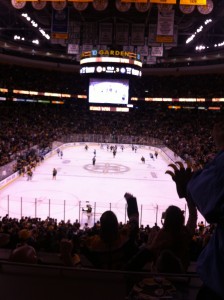 I can never quite take the writer hat off. I attended last Tuesday night’s Boston Bruins – Winnipeg Jets game at the TD Garden, my first NHL game of the season. I average one NHL game a year. (Depressing, I know, but I lack time and funds.)
I can never quite take the writer hat off. I attended last Tuesday night’s Boston Bruins – Winnipeg Jets game at the TD Garden, my first NHL game of the season. I average one NHL game a year. (Depressing, I know, but I lack time and funds.)
I told myself to just watch the game. I left my notepad in the car, and didn’t even carry a pen with me. I told myself I wouldn’t tweet either, since the service at the Garden when filled is seriously lacking.
Despite my attempts to just enjoy the game, I still had two quick notes I had to write up post-game. You can take the tools away from the writer, but you can never make them stop thinking like one. Here they are:
– Speed- There was a time a few years back when I would attend an NHL game and be instantly impressed at the speed difference between the pro game and the college game. The difference was marked – the pro game moved quicker, players not only skated faster but had better skating skills, and a player’s reflexes were that much more automatic.
The last two times I’ve attended a Bruins game, that difference has drastically decreased. It could be possible that it is because I’m simply not getting to games to make the comparison as often. But it just seems that since 2008, hockey observers have seen a marked improvement in the quality of play of college hockey players. The quality of passes and puck work in the NHL has decreased at the same level the college game has increased. Skating skills and speed in both the pro and college game have woefully decreased (qualities I didn’t learn how to evaluate until I started watching hockey with hockey players, but once I did, you can’t help but notice stride, edge security and speed.)
There is no longer that marked difference, that “wow – this is a different level” feeling, when you watch a NHL game as opposed to a college game. That’s equal parts wonderful for college hockey and a shame on the pro game.
-Seguin’s Shifts Off – Talented Tyler Seguin is still a teenager. Though you cannot deny his playmaking abilities and his contributions thus far to the Bruins, you can’t see his play purely through rose-colored glasses.
Seguin, like other immensely talented young hockey players both before and after him, has two switches. One controls his effort, and the other controls his natural talent. Every shift, a player like him has to decide to turn either one on or both on.
The natural talent switch is stuck on. It’s the switch to that lackluster light in the corner of the living room that provides you with no truely useful lighting source – it’s usually the light your grandmother leaves on a timer to try to convince would-be robbers someone is home.
The effort switch is not a given. It’s the light switch on the wall on the other side of the room. You really don’t feel like shuffling over to that side of the room. It’s out of the way of your final destination: the couch. Unless you are going to read or type and really need that light, there are times where you just don’t want to take the extra amount of energy to flip it on. You’ll rely on the lackluster light and the glow of the television.
Everyone in this world is naturally talented at something, and when it comes to whatever that is, they have those two switches. For Seguin, it’s hockey. Before every shift, he has to make that decision – is he going to expand that extra amount of energy and turn the effort swtich on?
Last Tuesday against the Jets, there were too many shifts where he wasn’t turning on the effort. He’d jump out for a shift and coast. Good plays and meaningful contributions will still happen because he’s talented, but not with the same regularity as they would if he would skate out on a shift with both talent and effort turned on. And that’s why his stats appear streaky at times – he will be on scoring fits and then be seemingly and suddenly extinguished. For example, he went on a six game scoring streak from October 29th until November 12th, amassing eight goals and three assists, and then only scored one assist in the next four games.
Seguin is far from alone. This is the same problem that was always evident to me when Colin Wilson played with BU – he took shifts off, thinking that he could coast on talent, put his stick down on the ice and volia! He’d score or assist magically, without having to try. Charlie Coyle suffered from this more severely. The shifts he turned on the effort shifts were increasingly rare as his BU tenure continued. He relies too much on his wingspan and talent, and doesn’t always put forth the effort that would push his playmaking ability over the edge. Every team has one – the young kid who thinks he’s invincible and superhuman, and can coast on the same talent that made him the star of mites, travel team, high school, and juniors.
Seguin won’t be felled by this for long – he has a tough coach and experienced teammates that won’t allow it. But it nagged me during a few games I watched on television, and when I finally saw a game live and could see the entire ice, it definitely stuck out for me. The “Seguinistas” may sling snowballs at me for pointing it out, but it’s not a death sentence for the talented forward, just a blemish.